Account Login
Don't have an account? Create One
Back in September, we put out a call for nominations for innovators who had found a way to turn their creativity and passion into a revenue stream. There were only two other qualifying criteria: they have to live in Atlantic Canada and they have to be 30 or younger as of our November 7 publication date.
And boy, did we get a response.
Our chosen 30 Under 30 are building the future of our region, helping solve world-sized problems like climate change from right here at home. And they’re dedicated to this region. Every one of them said without hesitation that they were in this to build the Atlantic Canadian economy and improve the local quality of life.
Doom and gloom? Not with all this heart and innovation on the horizon.
To learn about the Newfoundland and Labrador innovators who made our 2019 30 under 30 list, read on…
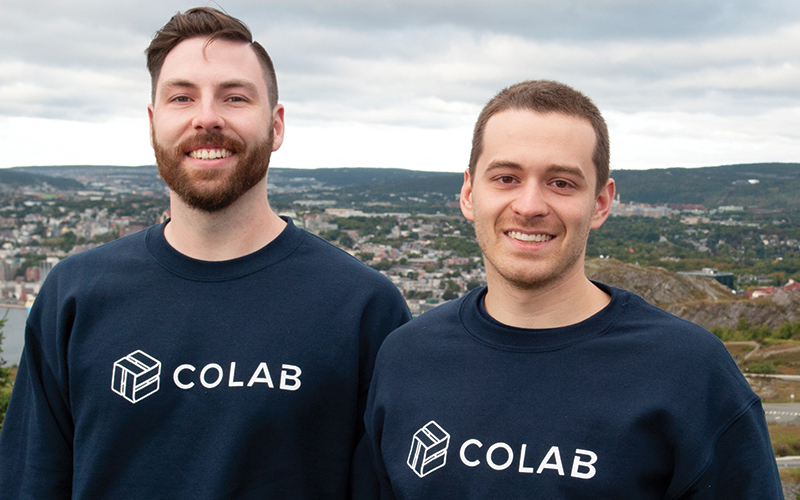
LEFT: ADAM KEATING (25)
CEO and co-founder
RIGHT: JEREMY ANDREWS (24)
CTO and co-founder
CoLab Software (St. John’s)
Adam Keating and Jeremy Andrews left jobs in sunny Silicon Valley to start a tech business in St. John’s—and they have no regrets.
“We’d always planned to be back here,” says Adam Keating who, with Andrews, founded CoLab Software Inc. in 2017. CoLab has created a web-based software called Gradient, built to help engineering and design teams collaborate on complicated projects.
They came up with the idea as engineering undergraduates when they worked on Memorial University’s Paradigm Hyperloop team. The team was building a pod that could travel at high speeds through a steel vacuum tube to compete in Elon Musk’s SpaceX Hyperloop competition in 2017 (yes, they met Musk). They qualified to do a real run on the Hyperloop track in California, and while they were there, they noticed the other teams were having the same issues: endless emails, screenshots, messy spreadsheets and messages—anything to track the problems and reviews. “I became pretty fixated on solving that,” Keating says.
Andrews says similar issues came up in collaborative design projects at Tesla, where he worked, and RefleXion Medical, where Keating worked. They decided to take a break from full-time work, move back to St. John’s and take an entrepreneurship course offered through Memorial’s Engineering program. They also talked to people in the industry about the issues they faced when collaborating on design and engineering projects.
“Everybody said what we expected,” Andrews says. “At that point we knew if we built a good enough designer e-platform, that there’d be a market for it.”
And so far, so good. They went back to California in the spring of 2019 to become the first Atlantic Canadian company to complete the prestigious Y Combinator accelerator program, which launched the likes of AirBnB and Dropbox. During the program’s closing pitch sessions, they raised $2.7 million from investors like Killick Capital and Silicon Valley venture capital funds Liquid 2, Spider Capital and FundersClub.
Along the way, CoLab has changed their target market, Andrews says. They originally aimed at smaller and mid-sized businesses and organizations, but now they’re zeroing in on larger enterprises and Fortune 500 companies. He won’t say how many clients are using CoLab software, but says the shift has worked out. With the latest injection of money into the business, CoLab is releasing a new version of its platform and hiring a swath of new employees.
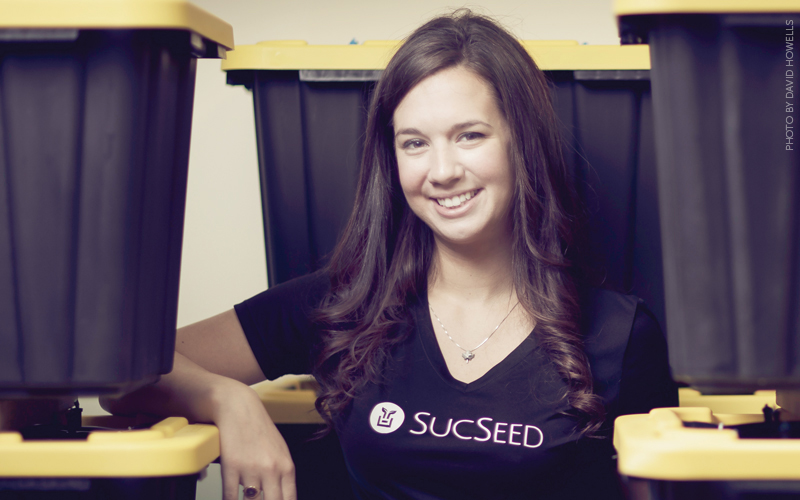
Emily Bland (25)
CEO
SucSeed (St. John’s)
Emily Bland started SucSeed in 2016 as a volunteer project for Memorial University’s Enactus team. The goal was to get more fresh produce into the hands of people in northern, remote communities where greens are scarce and expensive. “We were watching these multimillion-dollar organizations focus on growing fresh produce in outer space but we hadn’t figured out how to bring fresh produce to a large part of Canada,” she says.
The idea was a hit—it won the Enactus World Cup—and Bland saw she had a budding social enterprise. Sucseed was a SheEO top venture and was chosen for Venture 36’s accelerator program in Toronto in 2018.
Today, SucSeed employs four people and sells hydroponic grow kits assembled by at-risk youth. “It’s honestly the best part of my day to know that we’re building a company here in Newfoundland that employs… youth experiencing homelessness,” she says. Kit costs range from $169.99 to $389.99.
There are SucSeed kits in over 400 classrooms across Canada. Bland’s looking to develop in-class curriculum around the kits with teachers and, in the next three years, be educating 1,000,000 school kids each year about growing their own food.
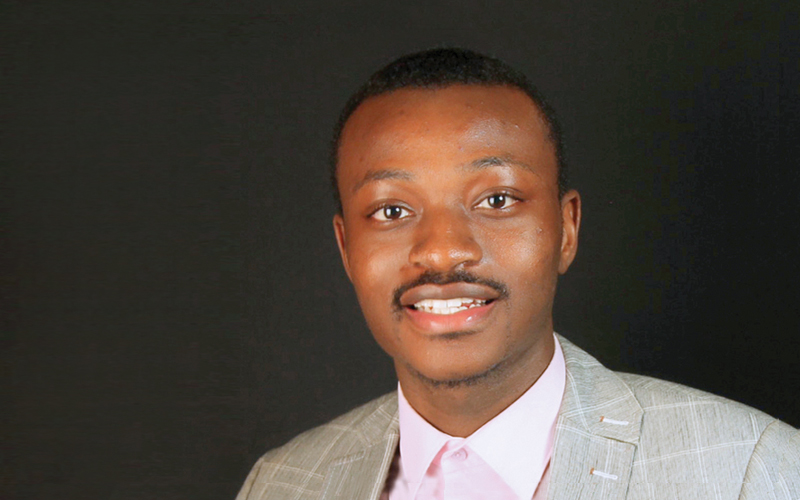
Tatenda Chirewa (23)
CEO and founder
TateChi Group (St. John’s)
Tatenda Chirewa moved to St. John’s from Zimbabwe in 2015 to study business administration at Memorial University. His idea for cancer care at home came as he walked through the H. Bliss Murphy Cancer Centre on his way to the health clinic in the Health Sciences Centre and saw a little girl—obviously a patient. “Why couldn’t she be at home at such a young, tender age?” he wondered. So at the end of 2018, he created TateChi Group and began working on its Cancer Care at Home program.
Cancer Care at Home’s team of nurses would visit patients at home and provide basic care like take blood samples and blood pressure, helping cancer patients avoid unnecessary, costly hospital stays. Chirewa hired a developer to make a prototype of an online platform where the nurses can log the patients’ vitals and provide updates on their care; information that will then be available to doctors overseeing the care.
In March, 2019, he partnered with Catalyst Health Solutions, a private nursing and medical services company based in St. John’s. He’s now working to set up a Cancer Care at Home pilot program with Eastern Health.
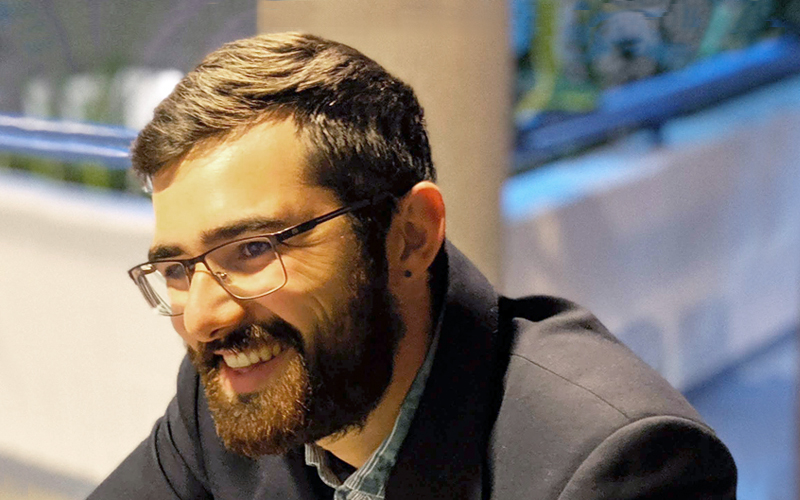
Jean-Philippe Dubois (24)
Co-founder
Havannah Health (St. John’s)
Jean-Philippe Dubois hopes to change the way people find health care services with his company, Havannah Health, and its app, Dr. Hava.
Dubois, who works in sales and management, co-founded the company with Modeline Longjohn, a biochemistry graduate student from Nigeria. He bought a ready-made app framework and taught himself enough code to turn it into Dr. Hava. People can use the app to find health services in their area. The goal is to curb unnecessary emergency room visits, and give people a centralized place to look for services.
“The need for it was extraordinarily clear in Nigeria,” Dubois says. “Sixty per cent of medical care there is through the private sector and there is no information about who provides what care.”
With both Dubois and Longjohn updating the app’s database of services, it’s ready for use in parts of Newfoundland and Nigeria. The app is on Google Play and will eventually generate revenue with ads. Dubois hopes to expand further into Nigeria, then to Ghana and the rest of the world. “We definitely see a global case for it.”
The company won $5,000 for the app at the Study and Stay N.L. seed funding competition this past August.
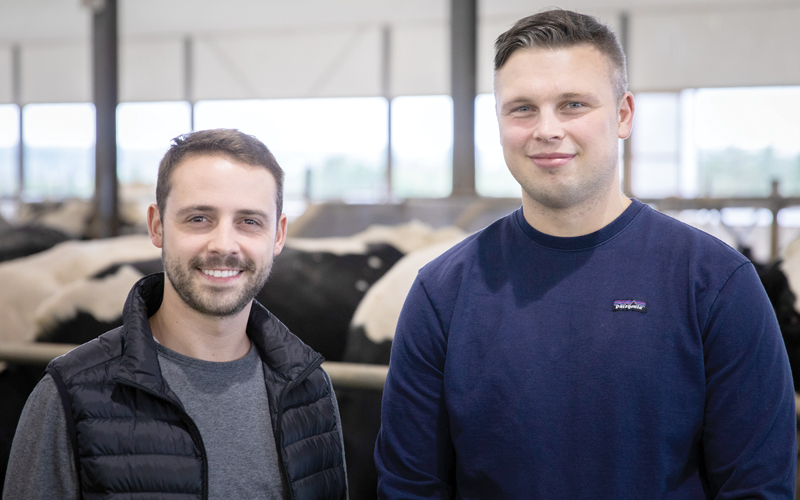
LEFT: ROBERT FORSYTHE (27)
RIGHT: JON KING (27)
Co-founders
Milk Moovement (St. John’s and Halifax)
Jon King is hoping to put himself out of a job with Milk Moovement. Well, his former self anyway. He used to work for the Newfoundland and Labrador Dairy Board, gathering carbon-copy milk slips filled out by farmers, reconciling them with sample-testing data sent back from the labs and manually entering all the data into a central system. He’d get an email back with the totals and then reconcile that with the dairy board’s numbers, which often meant a lot of back and forth with farmers figuring out if that mark made weeks ago was a four or a nine.
“It was pretty much the entire job … and it’s probably the most important function,” King says. “But damn it took a long time.”
King is no stranger to the startup world, having founded both Fytics and Vinocount, two online automated systems that let restaurants and bars track inventory. Knowing there was a better—and possibly commercial—way to get those milk slips and lab tests recorded and reconciled, he teamed up with Robert Forsythe, a fellow Memorial University commerce graduate. Together, they founded Milk Moovement in 2017, a cloud-based reporting system for dairy boards. Using the app on desktop or on smartphone, producers, processors and even milk truck drivers can get near-instant access to important information about production, quantity and quality.
“These producers used to get this information via email every 30 or 40 days. And now as soon as that milk leaves the farm, we have this information for them in real time,” says Robert Forsythe. “Because we have all that data, we can aggregate and then they can benchmark against industry standards.”
It also means anyone with King’s former job can be freed up to work on something else, or that the position isn’t needed at all and the savings can be passed on to producers, King says.
Faster information also means farmers can make faster nutritional decisions for their animals, Forsythe says.
The app launched in 2018 and Milk Moovement won $25,000 at Halifax’s Volta Cohort pitch contest in November of that year. Now, more than 30 farms across Newfoundland and Labrador are using the system through the province’s dairy board, which was Milk Moovement’s first customer. There’s a plan in the works to expand that to Prince Edward Island. Ultimately, King and Forsythe would like to moo-ve into the U.S. market and then across the world.

Santiago Guzman (23)
Founder
Todos Productions (St. John’s)
In 2015, Santiago Guzman came to Newfoundland from Mexico City to do a theatre degree and fulfill his dream of working as an artist. But he hit a few walls.
“I am an artist of colour, a queer artist, an immigrant artist, so I found a lot of barriers when it came to opportunities for me,” Guzman says. He didn’t see his stories reflected in local productions and was offered only minor roles. So he launched Todos, his own theatre company, aimed at giving under-represented voices a shot to be on stage and tell their stories.
Using the $5,000 he won pitching Todos at the Study and Stay N.L. seed funding competition in August, he’s commissioning people from under-represented communities to write plays and screenplays.
Todos’ first production hit the stage last September. Presented by the St. John’s Shorts Festival, funded by Guzman and directed by award-winning playwright Meghan Greeley, Altar told the story of a young Mexican man who summons his ex-boyfriend through a Day of the Dead altar in order to say goodbye.
“Now I think there’s a lot of hope for me as a diverse artist to stay, and to share my stories,” he says.
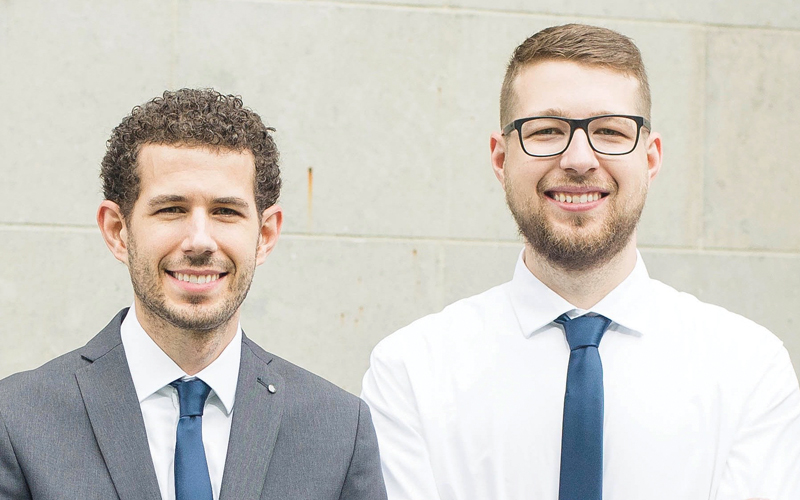
LEFT: JOSHUA GREEN (29)
CEO and co-founder
RIGHT: Zachary Green (26)
COO and co-founder
MYSA Smart Thermostats (St. John’s)
It can be hard to keep the faith in your ideas when you’re in the startup phase. But as brothers Josh and Zach Green built Mysa’s first smart thermostat prototype—and then a thriving company around it—they kept their eyes on a global problem.
“One of my biggest motivators in life is trying to help fight climate change,” says Josh Green. “It’s so much bigger than us and so crucial to solve.”
When Green finished his engineering degree at Dalhousie University, he launched a consulting business to help people green-up their homes in 2014. He was always recommending smart thermostats which let homeowners control their heat with their phones, thereby using less energy, but there weren’t any on the market for homes with electric baseboard heating which is one of the most common heating methods in Newfoundland and Labrador.
So in 2016, he roped in his brother Zach, who also had an engineering degree but was increasingly more interested in technology. The two began building Mysa and the first smart thermostat for electric baseboard heating.
They had help along the way from Propel’s accelerator program and Memorial’s Genesis Centre, where they operated until the space couldn’t hold them anymore. By late 2017, they had nearly 5,000 pre-orders and were preparing to move to their current office on Harvey Road in St. John’s. In December 2018, Mysa announced it had raised over $2 million from investors like Killick Capital and Vancouver’s Conconi Growth Partners.
Now, there are approximately 15,000 Mysa customers across Canada and the U.S. Each thermostat sells for about $139 and can save homeowners money on their heat bill, letting them turn the heat down when they leave the house and then crank it back up when they’re on their way home.
Mysa just launched another smart thermostat for in-floor heating, selling for $169 a unit. The Green brothers now employ 50 people through their company and are in the process of hiring a few more. Josh says Mysa’s mission to build a more sustainable, energy-efficient world is a powerful HR tool that has helped them attract and retain some of those employees.
“I’m really proud of the team we’ve built. It feels surreal to come in and do a job I love every day,” says Zach. “We love it here. We want to employ hundreds of people in Newfoundland. That’s the dream.”
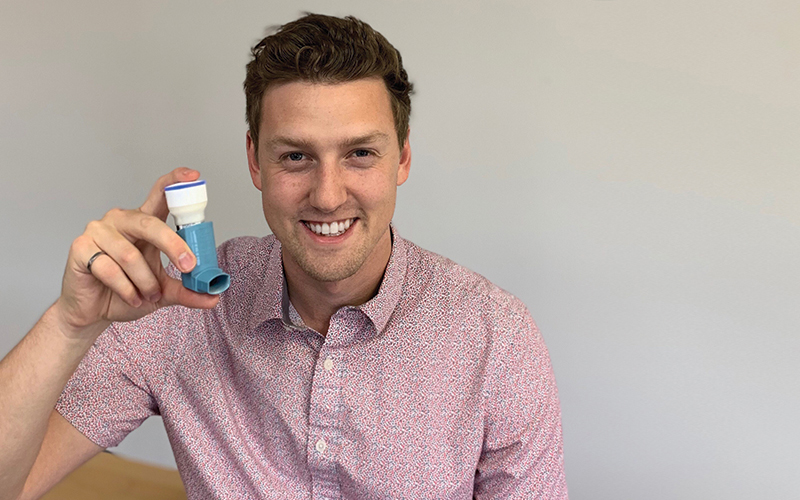
BRETT VOKEY (23)
Founder and CEO
BreatheSuite (St. John’s)
Brett Vokey created BreatheSuite after a stint at the Health Sciences Centre in St. John’s as a “designated problem-solver” with Memorial University’s Centre for Entrepreneurship. While he was at the busy hospital, he noticed a common problem in respiratory care. “People use their inhalers often incorrectly,” he says. “It actually requires a decent bit of coordination to get it correct.”
So Vokey, an engineering student, developed BreatheSuite’s hallmark product: a device that attaches to inhalers and gives immediate feedback via smart phone about the user’s technique and the amount of medicine they received.
Apparently he’s onto something. BreatheSuite won $10,000 in last spring’s Mel Woodward Cup pitch competition and just announced $550,000 in pre-seed funding led by Pelorus Venture Capital and supported by local and international angel investors. BreatheSuite’s product is in the FDA approval process. The product is in the process of FDA approval and there’s a pilot project planned at a Dallas hospital in the new year. Vokey is also hiring software developers and a marketing manager. He hopes to continue building his company, operating with a core team of eight to 10 employees.
“It’s been a lot of work. I just graduated in April, so for a while I was essentially working two jobs.”
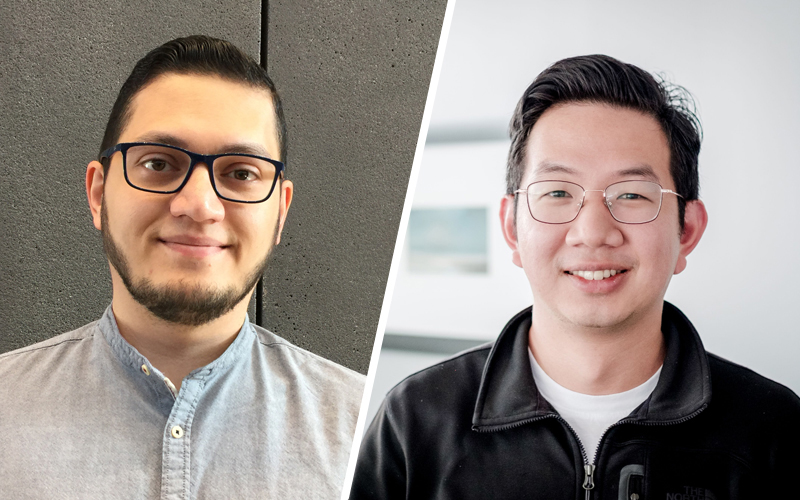
LEFT: SAHAND SEIFI (30)
Co-founder HeyOrca,
CTO & Co-Founder, Get Coding (Canada) (St. John’s)
RIGHT: JOE TEO (29)
Co-founder & CEO
HeyOrca (St. John’s)
Sahand Seifi and Joe Teo founded HeyOrca in 2014 after watching a marketing friend’s frustration with sending messy calendars and spreadsheets back and forth with clients to create, approve, schedule and publish social media posts. Teo says they figured if they could create an easy-to-use online platform that marketing agencies could use to collaborate with their clients, they’d have a successful business on their hands.
They graduated from Memorial University that year (Teo in business administration and Seifi in computer science) and launched the HeyOrca platform in 2015. It provides marketing agencies, brands and non-profits with an all-in-one platform where their social media managers can log in, select clients, create content and get feedback on their posts for multiple accounts. Others from within the organization can also log in and leave feedback and the organization can share the posts with clients or higher-ups for feedback and approval.
In 2015, they went through the Propel accelerator, then called Propel ICT, and got a hand from both the Canadian Digital Media Network and the Genesis Centre at Memorial University. By the spring of 2017, they closed a $2-million funding round from repeat investors Killick Capital and Pelorus Venture Capital. Teo says the HeyOrca platform is now used by over 400 agencies.
In June 2019, HeyOrca won StartUp Canada’s High Growth Entrepreneurship Award for the Atlantic region.
HeyOrca was one of the first of an emerging group of power-house tech companies looking to build a new economic future in Newfoundland and Labrador, and Teo says doing so is a huge motivator for him. “We really want to see the sector succeed and the economy diversify.”
Seifi left HeyOrca in September 2019 to join Get Coding, a company offering coding bootcamps in the province. Seifi says it’s all in line with his goals to help fill the talent gap in the province’s tech sector, something he saw all the time at HeyOrca. “This is the reality of every tech startup in Newfoundland, they have trouble filling their roles,” he says.
Get Coding bootcamps will provide an alternative to lengthy university or college programs and help people get faster, hands-on training so they can start applying for jobs quicker. “It’s something I’m super passionate about,” he says.
Comment policy
Comments are moderated to ensure thoughtful and respectful conversations. First and last names will appear with each submission; anonymous comments and pseudonyms will not be permitted.
By submitting a comment, you accept that Atlantic Business Magazine has the right to reproduce and publish that comment in whole or in part, in any manner it chooses. Publication of a comment does not constitute endorsement of that comment. We reserve the right to close comments at any time.
Cancel